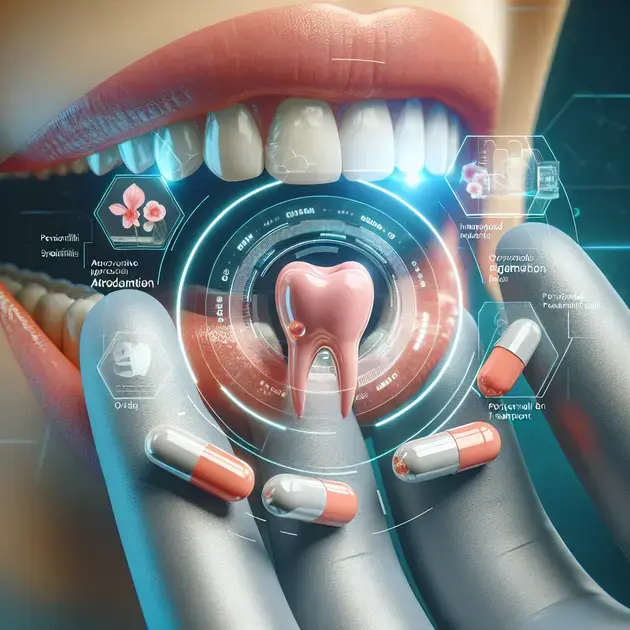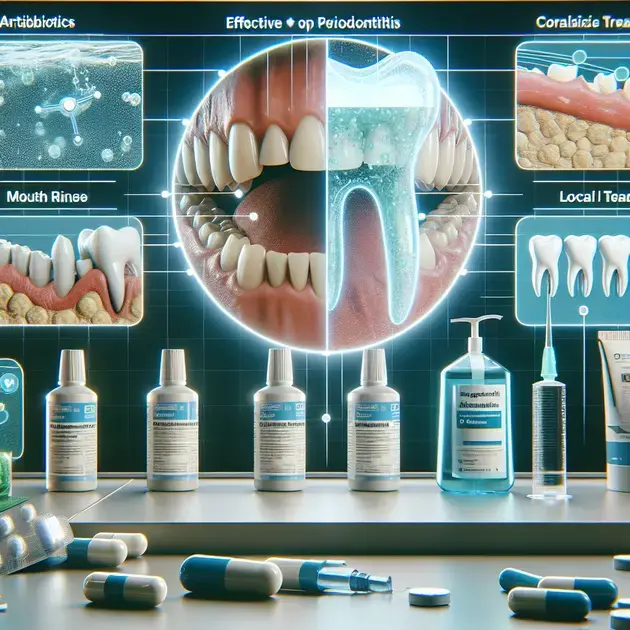When it comes to addressing periodontitis, exploring effective medication options is crucial for successful treatment. Periodontitis, a severe form of gum disease, can lead to various oral health complications if left untreated.
Recent studies have shown promising results in the effectiveness of certain medications in treating periodontitis. This article will delve into some of the most recommended medication options that have shown positive outcomes in combating this common dental issue.

Effective Medication Choices for Treating Periodontitis
Periodontitis is a serious gum infection that damages the soft tissue and destroys the bone supporting your teeth. In addition to professional dental treatments, medication can also play a crucial role in managing and treating periodontitis effectively. Here are some effective medication choices for treating periodontitis:
1. Antibiotics
Antibiotics are commonly prescribed to treat periodontitis, especially when the infection is severe. They can help kill the harmful bacteria causing the infection and reduce inflammation in the gums. One popular antibiotic for periodontitis treatment is Doxycycline, which comes in both pill and gel forms. You can easily find more information about antibiotics for periodontitis on reputable medical websites like WebMD.
2. Antiseptic Mouthwash
Using an antiseptic mouthwash can help control the growth of bacteria in your mouth and reduce plaque buildup, which is essential for managing periodontitis. A widely recommended antiseptic mouthwash for periodontitis is Listerine. You can purchase Listerine at most local pharmacies or order it online through popular e-commerce platforms like Amazon.
3. Enzyme Suppressants
Enzyme suppressants are medications that can inhibit the enzymes responsible for breaking down the bone and connective tissue in your mouth. By slowing down this process, enzyme suppressants can help prevent further damage to your gums and teeth. A well-known enzyme suppressant for periodontitis is Periostat. You can consult your dentist or orthodontist to learn more about using Periostat for periodontitis treatment.
4. Pain Relievers
Managing the pain and discomfort associated with periodontitis is crucial for improving your quality of life during treatment. Over-the-counter pain relievers like Ibuprofen can help reduce pain and inflammation in your gums. Make sure to follow the recommended dosage guidelines and consult your healthcare provider if you have any concerns about using pain relievers for periodontitis.
5. Prescription Mouth Rinse
In some cases, your dentist may prescribe a special mouth rinse containing antimicrobial agents to help control bacterial growth in your mouth. These prescription mouth rinses are designed to target specific bacteria responsible for periodontitis and promote better oral hygiene. You can obtain prescription mouth rinse from your dentist’s office or a licensed pharmacy.
Exploring Top Medication Options for Periodontitis Treatment
When it comes to treating periodontitis, exploring the top medication options available is essential for effectively managing the condition. From antibiotics to specialized mouth rinses, each medication has its unique role in combating periodontitis. Here are some top medication options worth exploring for periodontitis treatment:
1. Oral Antibiotics
Oral antibiotics are commonly prescribed to treat moderate to severe cases of periodontitis. Medications like Amoxicillin and Metronidazole are often used in combination to target the different strains of bacteria causing the infection. Your dentist or periodontist can provide you with a prescription for these antibiotics based on your specific needs.
2. Chlorhexidine Mouthwash
Chlorhexidine mouthwash is a powerful antiseptic rinse that can help reduce plaque and prevent bacterial growth in your mouth. It is often recommended for patients undergoing periodontal treatments to maintain oral hygiene and control infection. You can purchase Chlorhexidine mouthwash at most drugstores or online retailers like Walgreens.
3. Topical Antibiotics
Topical antibiotics in the form of gels or creams can be applied directly to the affected gum tissue to target localized infections and reduce inflammation. Medications like Arestin contain minocycline microspheres that release antibiotics over time, providing targeted treatment for periodontitis. Your dentist can administer these topical antibiotics during your dental appointments.
4. Corticosteroids
Corticosteroids are anti-inflammatory medications that can help reduce swelling and promote healing in the gums affected by periodontitis. They are often prescribed in conjunction with other periodontal treatments to enhance the overall effectiveness of the therapy. Your periodontist may recommend corticosteroid injections or topical creams to manage gum inflammation.
5. Bone-Modifying Agents
For advanced cases of periodontitis that have resulted in bone loss, bone-modifying agents like Teriparatide may be used to stimulate bone growth and regeneration. These medications help strengthen the bone structure around the teeth and improve the long-term prognosis of periodontitis treatment. Your periodontist can discuss the potential benefits of bone-modifying agents in your treatment plan.
Medication Solutions for Periodontitis: What Works Best?
When it comes to finding the best medication solutions for periodontitis, individual preferences and treatment goals play a significant role in determining the most effective options. From antibiotics to specialized oral rinses, each medication has its benefits and considerations for managing periodontitis effectively. Let’s explore what works best in terms of medication solutions for periodontitis:
1. Personalized Treatment Plans
Creating a personalized treatment plan with your dental healthcare provider is essential for determining the most suitable medication solutions for your specific case of periodontitis. Your dentist or periodontist will evaluate the severity of the infection, your overall health status, and any existing allergies or sensitivities to medications before recommending a tailored approach to treatment.
2. Combination Therapies
Combining different medication options, such as antibiotics, antiseptic mouthwashes, and enzyme suppressants, can enhance the effectiveness of periodontitis treatment. By targeting the infection from multiple angles, combination therapies can improve outcomes and help control the progression of the disease. Discussing the possibility of combination therapies with your dental provider can lead to better results.
3. Consistent Oral Hygiene Practices
While medications play a vital role in treating periodontitis, maintaining consistent oral hygiene practices is equally important for long-term success. Brushing and flossing regularly, using prescribed mouth rinses, and attending routine dental cleanings can support the effects of medication and prevent future recurrences of periodontal disease. Your dental hygienist can provide guidance on proper oral hygiene techniques.
4. Regular Follow-Up Visits
Monitoring your progress and adjusting your medication regimen as needed require regular follow-up visits with your dental healthcare provider. These appointments allow your dentist to assess the effectiveness of the medication, address any concerns or side effects, and make necessary modifications to your treatment plan. Committing to scheduled follow-up visits is crucial for optimizing the benefits of medication solutions for periodontitis.
5. Lifestyle Modifications
In addition to medication and dental treatments, making lifestyle modifications can further support your efforts in managing periodontitis. Quitting smoking, adopting a balanced diet rich in nutrients, and managing stress levels can contribute to improved gum health and overall well-being. Your healthcare provider can provide resources and guidance on incorporating healthy lifestyle changes into your routine.

Exploring Top Medication Options for Periodontitis Treatment
When it comes to addressing periodontitis, exploring the top medication options is crucial for effective treatment. One of the key medications used in treating gum disease is antibiotics. These medications can target and eliminate the bacteria causing the infection in the gums. Antibiotics can come in various forms, including pills, mouth rinses, or gels that can be directly applied to the affected area.
Another medication option to consider is antimicrobial mouthwash. This type of mouthwash contains active ingredients that can help reduce the bacteria in the mouth, promoting healthier gums. Antimicrobial mouthwashes can be used as part of a regular oral hygiene routine to help prevent and manage periodontitis.
In more severe cases of periodontitis, your dentist may recommend an antiseptic chip. This small chip is placed directly in the pockets of the gums where bacteria thrive. The chip slowly releases medication to target the infection and promote healing in the affected area.
It’s important to note that medication options for periodontitis treatment should always be prescribed and monitored by a dental professional. Proper diagnosis and treatment planning are essential to effectively manage gum disease and prevent further complications.
By exploring the top medication options for periodontitis treatment and working closely with your dentist, you can take proactive steps towards improving your gum health and overall oral hygiene.
Medication Solutions for Periodontitis: What Works Best?
When it comes to finding the best medication solutions for periodontitis, it’s important to consider the effectiveness and safety of the treatments available. One of the most commonly used medications for gum disease is antibiotic therapy. This treatment involves the use of antibiotics to target and eliminate the bacteria causing the infection in the gums.
In addition to antibiotics, your dentist may recommend the use of an antimicrobial mouth rinse. These rinses contain specific ingredients that can help reduce the bacteria in the mouth, promoting healthier gums and preventing further infection. Regular use of antimicrobial mouth rinses can be an effective part of your oral hygiene routine.
For some patients, a locally delivered antibiotic, such as a gel or chip, may be recommended. These medications are placed directly in the pockets of the gums to target the infection at the source. Localized antibiotic treatments can be particularly effective in treating stubborn cases of periodontitis.
It’s essential to work closely with your dental provider to determine the best medication solutions for your specific case of gum disease. Together, you can create a treatment plan that addresses your individual needs and promotes optimal oral health. By choosing the right medication solutions, you can effectively manage periodontitis and work towards a healthier smile.
Remember, consistent oral hygiene practices and regular dental visits are also key components of a successful treatment plan for periodontitis.
Discovering Effective Medication Approaches for Gum Disease Treatment
Discovering effective medication approaches for gum disease treatment is essential for managing and improving your oral health. One of the primary medication approaches for treating periodontitis is the use of systemic antibiotics. These antibiotics are taken orally and work to target and eliminate the bacteria causing the gum infection.
Another effective medication approach is the use of antiseptic mouthwashes. These mouthwashes contain ingredients that can help reduce the bacteria in the mouth, leading to healthier gums and a reduced risk of infection. Antiseptic mouthwashes can be used as part of a comprehensive oral care routine to promote gum health.
In some cases, your dentist may recommend a combination of antibiotic therapy and localized treatments, such as gels or chips. These targeted medications can provide additional support in treating the infection and promoting healing in the affected areas of the gums.
It’s important to consult with your dental provider to determine the most effective medication approaches for your specific case of gum disease. By working together to develop a customized treatment plan, you can address periodontitis effectively and improve your overall oral health.
Remember, maintaining good oral hygiene practices and following your dentist’s recommendations are essential for long-term success in managing gum disease and preventing future complications.
Conclusion
Exploring the top medication options for periodontitis treatment is crucial for effectively addressing gum disease. Antibiotics play a key role in targeting and eliminating the bacteria causing the infection in the gums, whether in the form of pills, mouth rinses, or gels. Incorporating antimicrobial mouthwashes into your oral hygiene routine can also aid in reducing bacteria and promoting healthier gums.
For more severe cases, the use of an antiseptic chip may be recommended by your dentist. This targeted approach involves placing the chip directly in the gum pockets to release medication gradually and facilitate healing. It’s imperative to always consult with a dental professional for proper diagnosis and treatment planning to manage gum disease effectively and prevent complications.
When considering medication solutions for periodontitis, a combination of systemic antibiotics, localized treatments like gels or chips, and antiseptic mouthwashes can be beneficial. Collaborating closely with your dental provider to tailor a treatment plan to your individual needs is essential for optimal oral health. By choosing the right medication solutions and maintaining consistent oral hygiene practices, you can work towards managing periodontitis and achieving a healthier smile.



